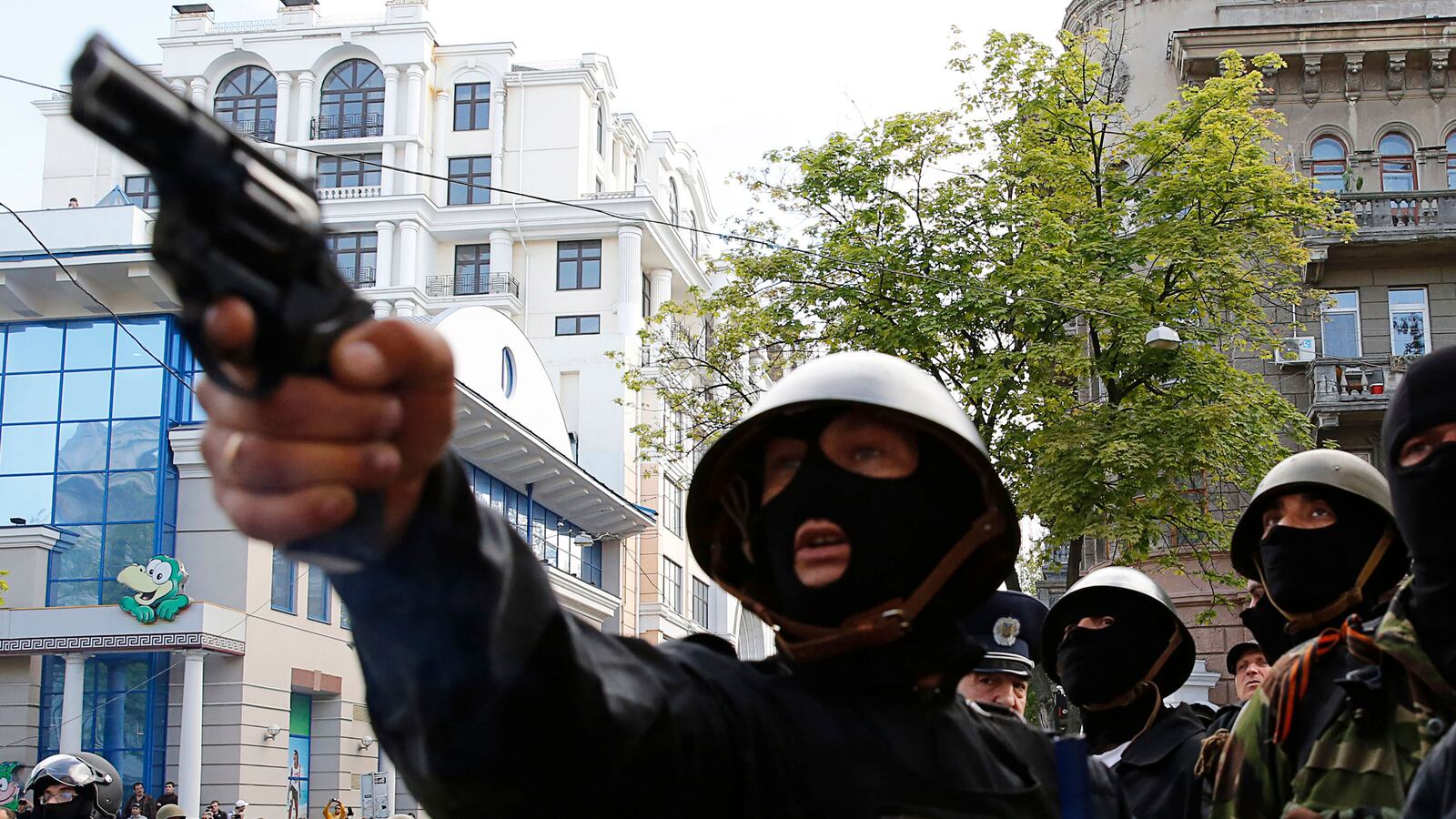ODESSA, Ukraine — When a large government building here housing a group of pro-Russian activists caught fire earlier this month, Yakov Otash rushed to help.

Otash, 26, is a fervent Ukrainian patriot. But he says politics didn’t matter as a battle between local supporters and opponents of the country’s Maidan revolution turned deadly on May 2. Until that day, the violence plaguing the country’s eastern provinces had eluded this pleasant port city on the Black Sea, known more for its world-renowned opera house and raucous summer tourist scene than political disputes.
Yet that prideful serenity ended when clashes between rival soccer fans sparked a violent charge on a camp of pro-Russian, anti-Maidan activists who had erected a tent city in front of The Trades Union Congress, a giant, Soviet-era building located in a park near the city center. The pro-Russian activists rushed inside for shelter, and soon both sides were hurling petrol bombs at each other. Eventually the building caught fire, leaving 46 people dead in the worst violence that Odessa has seen since the end of World War II.
Otash and members of his recently founded civic defense group, Brighter Future for Ukraine, did what they could to save those people trapped inside. Amid the flames, they put up scaffolding and threw ropes into windows. “We do not care about political affiliation,” Vitali Gdenisku, a 37-year-old member of the group told me. “We just want to prevent people from being hurt.” He himself was wounded in the battle, shot in the leg by a gunman he suspects was standing on the roof of the building.
Brighter Future is one of the many independent organizations that have sprung up in support of the Maidan Revolution, which drove former President Viktor Yanukovych from power in February. Though Maidan was successful in ousting the pro-Russian president, its participants do not consider this achievement to be the revolution’s definitive success. For while its members fervently support Ukrainian unity and have sworn to defend the country from all enemies foreign and domestic, they are wary of the new central government in Kiev that rode into power on their very backs.
“Maidan is distinctly separate from the current government,” says Baba, a rail-thin man with a long beard who looks like a monk. Indeed, he is a monk, or at least says he is, and he serves as something of a mystic, spiritual leader to Brighter Future’s members. When I ask him what religious denomination he represents, he replies, “every.”
Legally formed only a week ago, Brighter Future informally began organizing back in December, but its roots really go back to 2004, to Ukraine’s Orange Revolution, when a mass protest movement prevented Yanukovych from stealing a presidential election. It occupies a two-story apartment in central Kiev that resembles a makeshift wartime command center. A steady stream of young men and women enter the space to eat, register, and receive orders for daily tasks. There are airbeds for sleeping, and bags of food neatly piled in the corner of a room where an organization chart hangs on a wall. On the second floor, one room is being equipped to operate as an internet television news studio, and another is filled with walkie-talkies, assorted technical equipment, and pizza boxes.
The organization counts scientists, journalists, lawyers, laborers, and businessmen among its members and supporters. No one is paid; money for food and supplies is raised via internet crowd-sourcing or old-fashioned donation collection tins. Vladimir Shahettinin, a 40-year-old computer programmer and animator, makes what he describes as “patriotic cartoons.” Sitting on an air mattress, he proudly shows me one in which a Cossack wearing a shirt in the design of the Ukrainian flag is interrupted from watching TV when a large Russian bear and a two-headed soldier burst into his living room. The soldier scratches his rear, fires a gun into the air, and passes gas. The bear, suddenly tumescent, sexually penetrates one of the ubiquitous sandals seen on Russian men anytime in summer. (Odessians are known for their sense of humor; a group of pranksters with the Internet Party of Ukraine is running an elaborate Darth Vader for Mayor campaign featuring a television commercial in which the Sith Lord ascends the city’s famous Potemkin steps with hundreds of storm troopers in tow.) “Everyone with different talents is contributing how they can,” he says.
Ukraine’s new pro-Western government has tried to claim the spirit of the Maidan, but the men I met are having none of it. When I ask my interlocutors what their aim is past next week’s presidential election, Baba replies that, “Maidan will remain alert.” He stresses that Maidan — literally the Ukrainian word for “square”—is something much greater than a physical space or a momentary political movement. It is nothing less than an idea, a way of life. “Maidan is one big hammer over the politicians,” he says, a crude way of characterizing what is in essence an unofficial check on power in a multicameral system of government. “There is no other way to keep them responsible.”
Yet for a group that aims to monitor mischievous politicians, the bulk of Brighter Future’s work is decidedly non-political. The men spend most of their time maintaining check points, patrolling the city, and protecting marches and other public events, like the May 2 soccer game, that have the potential for spiraling out of control. Demonstrating this political neutralism, they provided muscle at recent local campaign events for both Petro Poroshenko and Yulia Tymoshenko, rival presidential candidates. “Regardless of who becomes president we want to protect Odessa,” Otash says. Besides, “People have no faith in the police. We took responsibility among ourselves.”
I ask Otash if his organization has any connections to Right Sector, a right wing, nationalist militia that, like Brighter Future, acts as a sort of vigilante organization. It has been the object of much Russian propaganda, its members the alleged “fascists” who engineered the Maidan revolution. Back in March, Ukraine’s interior minister told me how the group was threatening to destabilize Ukraine from within by refusing to lay down its weapons and integrate into the country’s desperately under-equipped armed forces. While the two groups have no formal affiliation, Otash tells me, they do communicate. A key difference between them is that Right Sector is a “political organization with political goals;” its leader, Dmitri Yarosh, is a candidate for president. Members of Right Sector, moreover, are noticeable for bearing weapons, and rose to prominence in the Maidan as a self-defense militia amidst the violence unleashed by Yanukovych’s security forces.
Brighter Future, by contrast, is interested mainly in “keeping the peace, and protecting people regardless of their political agenda,” Otash says. They talk of battling corruption, fixing the justice system, and establishing programs to protect ecology, children’s welfare, the elderly and disabled. They are, essentially, founding the civil society that Ukraine has never really had. But what about politics? “Nyet,” Gdenisku replies.
When I ask the men if they are trained in using weapons, all three reply in the negative, and stress that the situation has not deteriorated to the point where such training is yet necessary. Gdenisku displays for me an old revolver equipped with rubber bullets; this is the only weapon he bears. “The difference between Americans and Slavs,” he tells me with a smile, is that “we’ll pick up an assault rifle and figure it out. If we can’t shoot it, we’ll beat them with it.” (Last month, police raided the apartment complex, carting off boxes of Molotov cocktails).
Given the 40,000 or so Russian troops still amassed on Ukraine’s eastern border, and the active subversion efforts aimed at destabilizing the government, I ask the men why they have not joined the Ukrainian military or national guard. “There is no real chain of command in the army,” Baba tells me. They have helped the government as necessary, like when, last month, they captured, an alleged spy with a Russian passport and dozens of bank cards (purportedly for paying provocateurs). They turned him over to the Ukrainian intelligence service. But their aversion to signing up for their country’s defense forces goes beyond mere disappointment with organizational dysfunction, and strikes at the heart of why they established parallel structures to carry out what should be state functions in the first place. “So-called state leaders are not interested in the state,” Baba says. Gdenisku echoes this point. “The army is an instrument of the government. You cut off one head,” he says, referencing the decapitation of the Yanukovych regime, “and two arise.”
Oleksiy Kosarev, leader of a local anti-corruption organization, lent some credence to this conception. “What’s happening now, nothing has changed,” he told me over coffee at an Odessa café near the city center. “People who really want to do things are not in power.” He says nothing short of a full lustration—the method of purging government institutions employed by some countries after communism's collapse—will move Ukraine forward on the right track, and cites Georgia under former President Mikheil Saakashvili as an example. (The first thing Saakashvili did upon assuming power, literally over night, was fire the country’s notoriously corrupt traffic police). “If it that doesn’t happen in Ukraine, it will never change.”
Brighter Future is hoping to escape the dichotomization of Ukrainian politics, in which every individual is forced to choose whether to join “pro-Ukrainian” or “pro-Russian” camps. Supporting the former implies backing the current government in Kiev, for which the men I interviewed have little respect. Yet attempting to uphold the unity of the Ukrainian state has nonetheless put them in separatist crosshairs. Last month, men in masks attempting to break into the apartment complex where Brighter Future is based were chased off by police, but not after managing to damage the building’s wrought-iron gate. When I arrived at the apartment, a welder was busy putting it back together. Now, the facility is equipped with night vision surveillance cameras, and a sign warning visitors, “Smile, you’re being filmed.” A floodlight stands in the building courtyard ready to be switched on when it gets dark, and a generator is on hand in case the electricity goes out.
For Ukraine to survive, it will have to do so as a functioning state. While the betterment efforts of groups like Brighter Future and the panoply of other organizations formed in the wake of Maidan are laudable, at some point the country will have to move out of revolution mode and into some sense of normality. And it is here where the hazy, romantic talk of these men makes me fear that their exertions may be for naught in the light of cold, hard, geopolitical reality. What they’re doing, Baba says, is “part of a bigger project, called revolution…We have to establish a completely new relationship between people.” Thus spoke countless, earlier generations of failed, though no doubt principled and conscientious, revolutionaries.
But at the same time, one cannot help but admire these young men who, legitimately frustrated with a thieving political class, have shorn themselves of apathy and are doing what they can to make their country a better place. Otash, who used to work for a grain company, gave up his work “to help my country and my people,” namely, his two children. “I understand that if it’s not me, then who? I’m no longer fighting for my future in this country but my children’s future, so that they don’t become slaves of some oligarch’s family.” When I ask how he and his fellows can compete with the likes of billionaires and their ruthless political machines, he assures me, with the supreme confidence of a revolutionary, that “one idealist is worth 10 paid agents.”






